Bill Gottlieb
See book keywords and concepts |
 Ginkgo maximizes the flow of blood to the brain and helps protect neurons from free radicals. He recommends 240 milligrams a day.
DHA: The Fat Your Brain Needs
Docosahexaenoic acid (DHA) is a fat that is a building block of the brain and can help people with Alzheimer's retain brain function, Dr. Khalsa says. (Don't mistake this supplement for DHEA, the hormone.) He recommends taking 100 milligrams a day of DHA manufactured from microalgae.
FISH: Good for Neurons
Eat plenty of cold-water fish such as tuna, trout, mackerel, and salmon, Dr. Khalsa suggests. Ginkgo maximizes the flow of blood to the brain and helps protect neurons from free radicals. He recommends 240 milligrams a day.
DHA: The Fat Your Brain Needs
Docosahexaenoic acid (DHA) is a fat that is a building block of the brain and can help people with Alzheimer's retain brain function, Dr. Khalsa says. (Don't mistake this supplement for DHEA, the hormone.) He recommends taking 100 milligrams a day of DHA manufactured from microalgae.
FISH: Good for Neurons
Eat plenty of cold-water fish such as tuna, trout, mackerel, and salmon, Dr. Khalsa suggests. |
Michael T. Murray, N.D., Joseph E. Pizzorno, N.D.
See book keywords and concepts |
 Nevertheless, ginkgo extracts provide good antioxidant support and may also prove useful in the treatment of asthma.
TREATMENT SUMMARY
The effective treatment of asthma requires the consideration and control of many aspects. The following seven recommendations are given in order of priority.
1. Avoid airborne allergens, and allergy-proof the house.
2. Eliminate food allergens and food additives from the diet.
3. Follow a vegan diet with the possible exception of cold-water fish (salmon, mackerel, herring, halibut, etc.) for their omega-3 fatty acids.
4. Nevertheless, ginkgo extracts provide good antioxidant support and may also prove useful in the treatment of asthma.
TREATMENT SUMMARY
The effective treatment of asthma requires the consideration and control of many aspects. The following seven recommendations are given in order of priority.
1. Avoid airborne allergens, and allergy-proof the house.
2. Eliminate food allergens and food additives from the diet.
3. Follow a vegan diet with the possible exception of cold-water fish (salmon, mackerel, herring, halibut, etc.) for their omega-3 fatty acids.
4. |
John Heinerman
See book keywords and concepts |
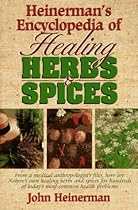 So Shen Nung instructed his servants to collect several baskets of ginkgo leaves and take them to the royal kitchen, where the cooks were instructed to make them into a simple brew. Once this was done, the warm tea was served several times each day to those suffering from varying degrees of senility. Within weeks, the Pen T'sao Ching noted, everyone of them had regained much of their lost memories! So Shen Nung instructed his servants to collect several baskets of ginkgo leaves and take them to the royal kitchen, where the cooks were instructed to make them into a simple brew. Once this was done, the warm tea was served several times each day to those suffering from varying degrees of senility. Within weeks, the Pen T'sao Ching noted, everyone of them had regained much of their lost memories! |
Stephen T., M.D. Sinatra
See book keywords and concepts |
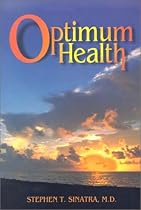 Ingest ginkgo biloba, 120 mg daily.
7. Use saw palmetto, 160 to 320 mg daily.
8. Consider Corynanthe yohimbe. (Note that yohimbine, a substance found in the bark of the yohimbe tree, is powerful and can have side effects. Since its primary action is to increase blood flow to erectile tissue, an increase in heart rate and blood pressure may occur. Corynanthe yohimbe should not be used without the supervision of a physician.)
9. Consider Muira puama. (This herb, native to Brazil, has long been used to improve libido and sexual function. Ingest ginkgo biloba, 120 mg daily.
7. Use saw palmetto, 160 to 320 mg daily.
8. Consider Corynanthe yohimbe. (Note that yohimbine, a substance found in the bark of the yohimbe tree, is powerful and can have side effects. Since its primary action is to increase blood flow to erectile tissue, an increase in heart rate and blood pressure may occur. Corynanthe yohimbe should not be used without the supervision of a physician.)
9. Consider Muira puama. (This herb, native to Brazil, has long been used to improve libido and sexual function. |
| Most of these nutritionals, including L-tyrosine, B vitamins, and ginkgo, can be purchased in health food stores.
NUTRITIONAL SUPPORT FOR PROSTATE HEALTH
As a cardiologist, I treat many men over the age of fifty. Many of these men have prostate problems as well. While lecturing to the prostate support group at Manchester Memorial Hospital, I was amazed at how many younger men (in their forties) had prostate problems, including cancer. Diet is one of the best ways to protect against prostate cancer. Throughout this book I have been praising the healing capabilities of soybean products. |
| Please note that tyrosine should not be taken in the presence of antipsychotic medications (usually prescribed by physicians) or in the presence of malignant melanoma, a form of skin cancer.
4. ginkgo biloba, 40 mg three times daily.
5. Saint-John's-wort, 300 mg three times daily. Saint-John's-wort is an herbal remedy for depression. Hypericin, the active ingredient, causes an inhibition of serotonin re-uptake. It has been nicknamed "herbal Prozac."
NUTRIENTS FOR THE AGING BRAIN?"I CAN'T REMEMBER . . . |
| No toxicity from ginkgo has been reported in the literature, even after prolonged treatment.
Echinacea
Echinacea is another herb I frequently recommend. Echinacea is one of the many coneflowers, a group of native American wildflowers in the sunflower family. There are nine species, but Echinacea angustifolia, Echinacea purpurea, and Echinacea pallida are the most commonly used. Since it provides the most active range of medicinal chemical compounds, Echinacea purpurea is used more often than the other two species mentioned above. |
John Heinerman
See book keywords and concepts |
 Chinese Restorative for Memory Loss
The earliest mention of ginkgo as a medicine is found in the ancient Chinese materia medica Pen T'sao Cbing, published in 2800 B.C. and attributed to China's first emperor and sage Shen Nung.
This very early text describes how some members of the royal court became a trifle senile as they advanced in years. Nothing seemed to work to help them recover some of their lost memory. Chinese Restorative for Memory Loss
The earliest mention of ginkgo as a medicine is found in the ancient Chinese materia medica Pen T'sao Cbing, published in 2800 B.C. and attributed to China's first emperor and sage Shen Nung.
This very early text describes how some members of the royal court became a trifle senile as they advanced in years. Nothing seemed to work to help them recover some of their lost memory. |
Dharma Singh Khalsa, M.D.
See book keywords and concepts |
 In addition, many of these products are fortified with a number of other natural brain tonics, including astragalus, lecithin, beet juice powder, bee pollen, ginkgo, and green tea extracts.
Because of this broad range of ingredients, these products offer the patient a veritable smorgasbord of micronutrients. Often these micronutrients are obscure chemical compounds that are not present in most common foodstuffs.
Of particular value to brain longevity patients are the combinations of amino acids (or partial proteins) that are abundant in green juice products. In addition, many of these products are fortified with a number of other natural brain tonics, including astragalus, lecithin, beet juice powder, bee pollen, ginkgo, and green tea extracts.
Because of this broad range of ingredients, these products offer the patient a veritable smorgasbord of micronutrients. Often these micronutrients are obscure chemical compounds that are not present in most common foodstuffs.
Of particular value to brain longevity patients are the combinations of amino acids (or partial proteins) that are abundant in green juice products. |
| I strongly recommend ginkgo to virtually all of my patients. For people in midlife, who have no apparent cognitive dysfunction, a daily dosage of 90 mg is often sufficient. If cognitive decline has begun, this dosage level may be increased to between 120 and 160 mg. If frank pathology exists, patients may be advised to take 200 to 320 mg daily. For most people, however, 120 mg is sufficient. Dosages should be spread evenly throughout the day, in three administrations. |
| In addition to a wide range of vitamins and minerals, his nutritional program also included regular ingestion of a number of natural medicinal tonics, including ginkgo biloba; a high-quality Chinese ginseng product, Ching Chun Bao; a full-spectrum "green-juice" product; and high dosages of vitamin C (up to 7 grams daily).
According to the Western interpretation of nutritional therapy, these medications provided the optimal biochemical milieu for his cognitive function. |
Andrew L. Stoll
See book keywords and concepts |
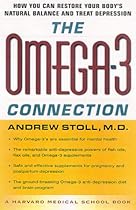 Natural food pundits have advocated ginkgo biloba, ginseng, and other herbs to stoke the engines of cognition. However, two of the leading natural candidates for cognitive sharpening may be the long-chain omega-3 fatty acids, EPA and DHA.
Numerous studies document the role of omega-3 fatty acids in the development of the human brain. Animals and humans lacking these fatty acids during gestation and the first years of life score lower on IQ tests and a range of cognitive benchmarks. Natural food pundits have advocated ginkgo biloba, ginseng, and other herbs to stoke the engines of cognition. However, two of the leading natural candidates for cognitive sharpening may be the long-chain omega-3 fatty acids, EPA and DHA.
Numerous studies document the role of omega-3 fatty acids in the development of the human brain. Animals and humans lacking these fatty acids during gestation and the first years of life score lower on IQ tests and a range of cognitive benchmarks. |
Bill Gottlieb
See book keywords and concepts |
 Quillin recommends 40 milligrams daily of a ginkgo product with 24 percent heterosides.
• Astragalus. To help prevent weight loss during chemotherapy, strengthen the immune system, and stop the spread of tumors, Dr. Quillin advises colon cancer patients to take 200 milligrams a day.
• Cat's claw. It helps friendly, anti-cancer bacteria thrive in the colon. Take 250 milligrams a day, says Dr. Quillin. Quillin recommends 40 milligrams daily of a ginkgo product with 24 percent heterosides.
• Astragalus. To help prevent weight loss during chemotherapy, strengthen the immune system, and stop the spread of tumors, Dr. Quillin advises colon cancer patients to take 200 milligrams a day.
• Cat's claw. It helps friendly, anti-cancer bacteria thrive in the colon. Take 250 milligrams a day, says Dr. Quillin. |
Dr. Gary Null
See book keywords and concepts |
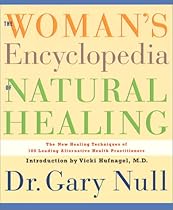 Jansen, "Primary Degenerative Dementia: Therapy with ginkgo biloba Extract," Fortschr. Medicine 104 (1986): 199-202.
The herbal formulation Mentat improves memory and cognition in patients who are aged or chronically ill.
S. K. Bhattacharya et al., "Effect of Mentat, an Herbal Formulation, on Experimental Models of Alzheimer's Disease and Central Cholinergic Markers in Rats," Fitoterapia 67, no. 3 (1995): 216-22.
Ten Alzheimer's patients with sleep disturbances were given bright light exposure for 2 hours per day between 7 and 9 p.m. for 1 week. Jansen, "Primary Degenerative Dementia: Therapy with ginkgo biloba Extract," Fortschr. Medicine 104 (1986): 199-202.
The herbal formulation Mentat improves memory and cognition in patients who are aged or chronically ill.
S. K. Bhattacharya et al., "Effect of Mentat, an Herbal Formulation, on Experimental Models of Alzheimer's Disease and Central Cholinergic Markers in Rats," Fitoterapia 67, no. 3 (1995): 216-22.
Ten Alzheimer's patients with sleep disturbances were given bright light exposure for 2 hours per day between 7 and 9 p.m. for 1 week. |
Earl Mindell and Hester Mundis
See book keywords and concepts |
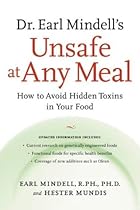 Other than that, I suggest ginkgo biloba, 60 mg three times daily; two to four saw palmetto-zinc-pumpkin seed oil combination capsules daily; and argi-nine, 4 to 5 g, taken forty-five minutes before sex.
FOOD FOR THOUGHT
?A ten-year study conducted by the University of Bristol, England, found that men who have sex three or more times a week reduce their risk of a major heart attack or stroke by about 50 percent!
?Almost 20 percent of people older than age sixty-five have diabetes. Type 2 diabetes, often caused by obesity, accounts for 90 to 95 percent of these cases. Other than that, I suggest ginkgo biloba, 60 mg three times daily; two to four saw palmetto-zinc-pumpkin seed oil combination capsules daily; and argi-nine, 4 to 5 g, taken forty-five minutes before sex.
FOOD FOR THOUGHT
?A ten-year study conducted by the University of Bristol, England, found that men who have sex three or more times a week reduce their risk of a major heart attack or stroke by about 50 percent!
?Almost 20 percent of people older than age sixty-five have diabetes. Type 2 diabetes, often caused by obesity, accounts for 90 to 95 percent of these cases. |
Phyllis A. Balch, CNC
See book keywords and concepts |
 Do not take ginkgo if you are taking blood-thinning medication. Discuss the use of this herb with your doctor before having any type of surgery.
HERBS TO AVOID
LJ People who have tinnitus should avoid uva ursi, viburnum, white willow, and wintergreen oil. (For more information regarding these herbs, see UVA URSI, WILLOW BARK, and/or WINTERGREEN under The Herbs in Part One. Do not take ginkgo if you are taking blood-thinning medication. Discuss the use of this herb with your doctor before having any type of surgery.
HERBS TO AVOID
LJ People who have tinnitus should avoid uva ursi, viburnum, white willow, and wintergreen oil. (For more information regarding these herbs, see UVA URSI, WILLOW BARK, and/or WINTERGREEN under The Herbs in Part One. |
| LJ Avoid taking blue cohosh, dan shen, feverfew, garlic, ginkgo, red yeast (Cholestin), wintergreen oil, or viburnum if you are taking warfarin (Coumadin) after stroke.
LJ If you smoke, quit. Smoking raises blood pressure, which increases the risk of a second stroke.
-J Drink steam-distilled water only, to avoid exposure to waterborne toxins.
—I Maintain high levels of high-density lipoproteins (HDL, or "good" cholesterol), preferably above 42 mg/dl. |
| Do not take ginkgo if you are taking blood-thinning medication. Discuss the use of this herb with your doctor before having any type of surgery.
FORMULAS
FORMULA COMMENTS
Rhubarb and Moutan A traditional Chinese herbal formula successfully used in Decoction Japan to help restore self-expression after a stroke.
RECOMMENDATIONS
LJ Consult your physician about taking high dosages of several B vitamins, including B6 (pyridoxine), B12 (cobal-amin), and folic acid. |
| Ginkgo is not useful for preventing heart attacks for people with diabetes. "Do not use Scutellaria if you have diarrhea.
FORMULAS
FORMULA COMMENTS
Bupleurum Plus Most useful Chinese herbal formula for controlling stress
Dragon Bone and reactions that increase the risk of heart attack. Reduces the
Oyster Shell rate at which the body produces epinephrine in response to
Decoction1 stress; treats general anxiety and muscular tension.
Precautions for the use of formulas:
1Do not use Bupleurum Plus Dragon Bone and Oyster Shell Decoction if you have a fever. |
Earl Mindell and Hester Mundis
See book keywords and concepts |
 A broad-spectrum antioxidant formula (containing alpha- and beta-carotene, lutein, lycopene, vitamin C, vitamin E, selenium, ginkgo biloba, coenzyme Q10, bilberry, L-glutathione, soy isoflavones [genistein and daidzein], grapeseed extract, and green tea extract)
Take each of these twice daily, A.M. and P.M., with meals. (Dosage is suitable for individuals over twelve years of age.)
50. Do Eggs Have a Sunny Side?
You bet they do. They've been maligned, misunderstood, and mistreated, but they've made a nutritional comeback—and they've got a lot to offer. A broad-spectrum antioxidant formula (containing alpha- and beta-carotene, lutein, lycopene, vitamin C, vitamin E, selenium, ginkgo biloba, coenzyme Q10, bilberry, L-glutathione, soy isoflavones [genistein and daidzein], grapeseed extract, and green tea extract)
Take each of these twice daily, A.M. and P.M., with meals. (Dosage is suitable for individuals over twelve years of age.)
50. Do Eggs Have a Sunny Side?
You bet they do. They've been maligned, misunderstood, and mistreated, but they've made a nutritional comeback—and they've got a lot to offer. |
Mark Stengler, N.D.
See book keywords and concepts |
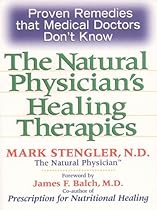 A protocol of antioxidants (such as lutein, zinc, carotenoids, vitamins C and A, and grape seed), along with bilberry and ginkgo extract is what I routinely recommend to people with this condition.
°^ Night Vision
Research has shown that bilberry improves energy production in the eye, critical to good night vision. Bilberry extract demonstrated significant improvements in pilots' speed-adaptation ability to light changes. While one study has challenged this assumption, we know that bilberry has been helpful for people in the past. A protocol of antioxidants (such as lutein, zinc, carotenoids, vitamins C and A, and grape seed), along with bilberry and ginkgo extract is what I routinely recommend to people with this condition.
°^ Night Vision
Research has shown that bilberry improves energy production in the eye, critical to good night vision. Bilberry extract demonstrated significant improvements in pilots' speed-adaptation ability to light changes. While one study has challenged this assumption, we know that bilberry has been helpful for people in the past. |
| I recommend combining the essential fatty acids with supplements like ginkgo, bilberry, alpha lipoic acid, vitamins E and B12, and folic acid. This is a very powerful, comprehensive, nutritional approach for diabetic neuropathy.
^ Eczema
Children with eczema tend to have an inherited problem of converting linoleic acid into GLA. Studies have shown that their mothers also have a history of eczema and have low levels of GLA in their breast milk. They also have higher levels of linoleic acid, signifying a conversion problem. |
Earl Mindell and Hester Mundis
See book keywords and concepts |
 An all-natural high-potency multiple vitamin and amino acid—chelated mineral complex (containing digestive enzymes for better absorption and no preservatives or artificial colors) and
A broad-spectrum antioxidant formula (containing alpha- and beta-carotene, lutein, lycopene, vitamin C, vitamin E, selenium, ginkgo biloba, coenzyme Q10, bilberry, L-glutatbione, soy isoflavones, grapeseed extract, and green tea extract)
Take each of these twice daily, A.M. and P.M., with meals. (Dosage is suitable for individuals over twelve years of age. An all-natural high-potency multiple vitamin and amino acid—chelated mineral complex (containing digestive enzymes for better absorption and no preservatives or artificial colors) and
A broad-spectrum antioxidant formula (containing alpha- and beta-carotene, lutein, lycopene, vitamin C, vitamin E, selenium, ginkgo biloba, coenzyme Q10, bilberry, L-glutatbione, soy isoflavones, grapeseed extract, and green tea extract)
Take each of these twice daily, A.M. and P.M., with meals. (Dosage is suitable for individuals over twelve years of age. |
Lita Lee, Lisa Turner and Burton Goldberg
See book keywords and concepts |
 Thera-zyme VSCLR (Vascular) or Enzyme & Herbal Formula #2
Contains the enzymes protease, amylase, lipase (formula highest in lipase), plus the following herbs: bilberry extract, fenugreek seeds, ginkgo biloba leaf, and dandelion root. For problems involving the cardiovascular system. Thera-zyme VSCLR (Vascular) or Enzyme & Herbal Formula #2
Contains the enzymes protease, amylase, lipase (formula highest in lipase), plus the following herbs: bilberry extract, fenugreek seeds, ginkgo biloba leaf, and dandelion root. For problems involving the cardiovascular system. |
Dr. Gary Null
See book keywords and concepts |
 Effects of Natural Antioxidant ginkgo biloba Extract (EGB 761) on Myocardial Ischemia-Reperfu-sion Injury," Free Radio. Biol. Med. 16, no. 6 (June 1994): 789-94.
Berberine was shown to help regulate heartbeat.
W. Huang, [Ventricular Tachyarrhythmias Treated with Berberine], Chung Hua Hsin Hsueh Kuan Ping Tsa Chih 18, no. 3 (1990): 155-56.
A controlled study found that patients taking 500 mg of cynarin per day for 50 days experienced significant reductions in their levels of total cholesterol, triglyceride, and pre-beta-lipoprotein.
M. Montini et al. Effects of Natural Antioxidant ginkgo biloba Extract (EGB 761) on Myocardial Ischemia-Reperfu-sion Injury," Free Radio. Biol. Med. 16, no. 6 (June 1994): 789-94.
Berberine was shown to help regulate heartbeat.
W. Huang, [Ventricular Tachyarrhythmias Treated with Berberine], Chung Hua Hsin Hsueh Kuan Ping Tsa Chih 18, no. 3 (1990): 155-56.
A controlled study found that patients taking 500 mg of cynarin per day for 50 days experienced significant reductions in their levels of total cholesterol, triglyceride, and pre-beta-lipoprotein.
M. Montini et al. |
Dharma Singh Khalsa, M.D.
See book keywords and concepts |
 These include such nutrients as ginkgo biloba and various other herbs from the Asian pharmacopeia, such as ginseng. Other natural medicinal tonics that are of particular benefit are phosphatidyl serine, phosphatidyl choline, and acetyl-L-carnitine.
Another nutritional tonic I often recommend is a "green juice" that includes such ingredients as blue-green algae, wheat grass, and spirulina. These products are the richest possible sources of partial proteins called peptides, which the brain converts to neuropeptides (such as the well-known beta endorphins). These include such nutrients as ginkgo biloba and various other herbs from the Asian pharmacopeia, such as ginseng. Other natural medicinal tonics that are of particular benefit are phosphatidyl serine, phosphatidyl choline, and acetyl-L-carnitine.
Another nutritional tonic I often recommend is a "green juice" that includes such ingredients as blue-green algae, wheat grass, and spirulina. These products are the richest possible sources of partial proteins called peptides, which the brain converts to neuropeptides (such as the well-known beta endorphins). |
Dr. Gary Null
See book keywords and concepts |
 Traitement des troubles du vieillissement cerebral par I'extrait de ginkgo biloba: Etude longitudinale multicentrique a double insu face au placebo," Presse Med 15, no. 31 (Sept. 25, 1986): 1583-87.
Animal research showing that aged garlic extract improves memory acquisition suggests that the extract may be useful for humans.
T. Moriguchi et al., "Prolongation of Life Span and Improved Learning in the Senescence Accelerated Mouse Produced by Aged Garlic Extract," Biol. Pharm. Bull. 17, no. 12 (December 1994): 1589-94. Traitement des troubles du vieillissement cerebral par I'extrait de ginkgo biloba: Etude longitudinale multicentrique a double insu face au placebo," Presse Med 15, no. 31 (Sept. 25, 1986): 1583-87.
Animal research showing that aged garlic extract improves memory acquisition suggests that the extract may be useful for humans.
T. Moriguchi et al., "Prolongation of Life Span and Improved Learning in the Senescence Accelerated Mouse Produced by Aged Garlic Extract," Biol. Pharm. Bull. 17, no. 12 (December 1994): 1589-94. |
| In a study of 40 patients, 20 were treated with 80 mg of ginkgo biloba extract for 3 months rather than with a placebo. After 1 month of this double-blind study, the treated patients showed significant improvement in memory and attention, psychopathology, psychomotor performance, functional dynamics, and neurophysiology.
B. Hofferberth, "The Efficacy of Egb 761 in Patients with Senile Dementia of the Alzheimer Type: A Double-Blind, Placebo-Controlled Study on Different Levels of Investigation," Human Psychopharmacology 9 (1994): 215-22. |
| Biloba. ginkgo helps improve small blood vessel circulation.
Hawthorn berry. Hawthorn is an overall heart tonic that works against arrhythmia, angina, blood pressure, and hardening of the arteries. It aids circulation, as well as ameliorating valvular insufficiency and an irregular pulse. Hawthorn berry can also correct acid conditions of the blood, and can be safely taken every day.
Mistletoe. Mistletoe is a cardiac tonic that stimulates circulation. Fifteen drops taken three times a day, or three cups of tea daily, help lower blood pressure and alleviate heart strain. |
| Other plant supplements such as ginkgo biloba and American ginseng provide antiaging benefits and aid in preventing cerebral disorders.
Perhaps surprisingly, restriction of food in general has been shown to slow the aging process in animals, suggesting that caloric intake should be lessened with increasing age. More specifically, excess sucrose in the diet may accelerate aging, inducing hyperglycemia and hyperinsulinemia.
Studies suggest that mental deterioration in Alzheimer's patients can be slowed by supplementation of iron, vitamins B6 and B12, coenzyme Q10, and acetyl-L-carnitine. |












